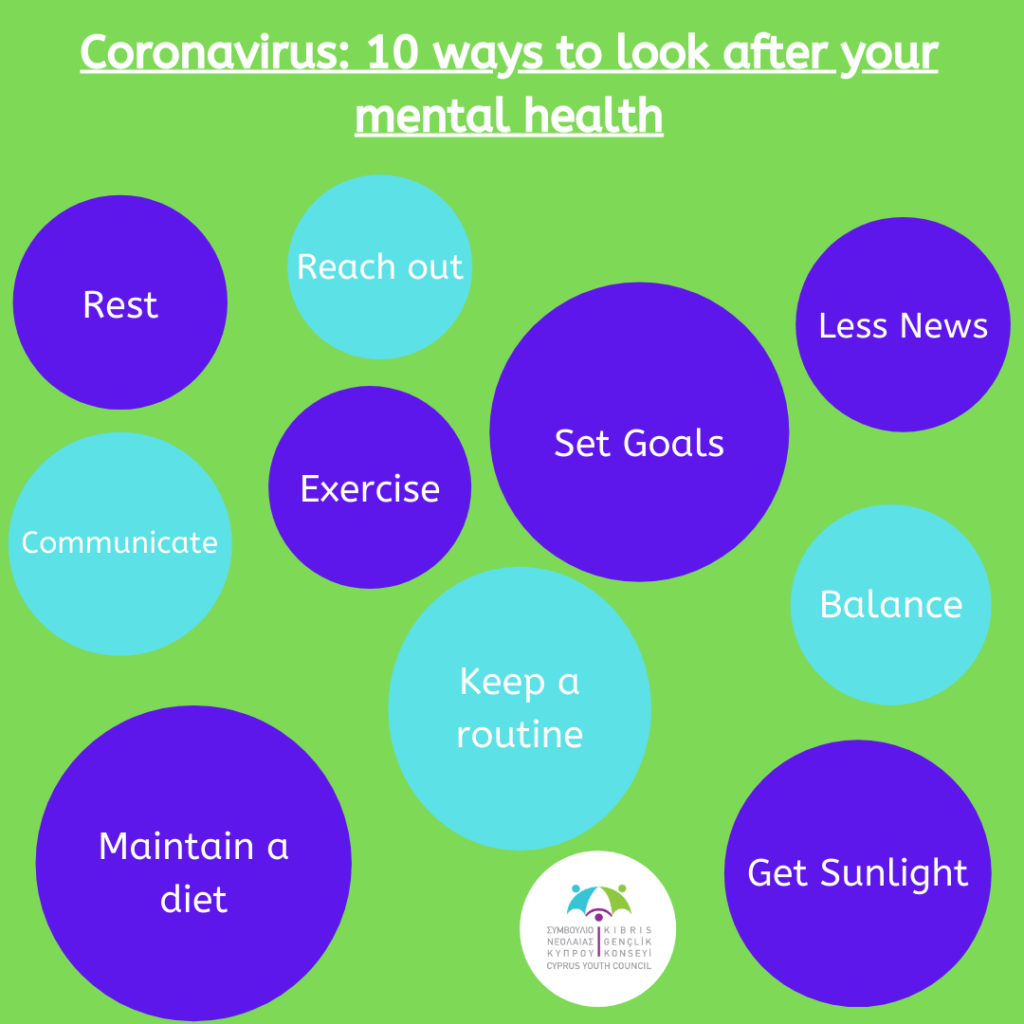
The coronavirus pandemic and the various forms of lockdowns that world governments have applied to control it, can be major tests for our mental health.
The sudden disruption of our daily lives, the lack of physical communication with our friends and family, as well as the uncertainty over the economy can easily lead to stress and enhance pre-existing mental health conditions.
To help each other cope we’ve collected 10 ways to look after our mental health from WHO, youngminds.org.uk and our friends at Mental Health Europe:
Maintain a routine
Now that the structure we had in our lives has largely collapsed, it is very easy to get lost in work or in doing nothing.
A routine or daily plan can help give back that structure. Try to set an alarm and force yourself to get up and do something – whether it’s exercise, eating or working, getting out of bed will help you avoid falling into a slump.
Get some sunlight
Those of us who work from home and don’t have dogs (try and put a leash on your cat!) can only get out of the house once a day. We recommend that you put this once a day into good use. Go for a walk in the fresh air every day to get you out of the house as well as releasing endorphins
Limit your news consumption
Coronavirus is the main story in every news website in the world. This is a new situation for all of us (even experts and world leaders) and the stories are developing rapidly, so it is only natural to be hitting refresh every 10 minutes to read the latest updates.
However, this can be damaging to our mental health. The World Health Organization recommends to “minimize watching, reading or listening to news about COVID-19 that causes you to feel anxious or distressed; seek information only from trusted sources and mainly so that you can take practical steps to prepare your plans and protect yourself and loved ones. Seek information updates at specific times during the day, once or twice.”
Set goals
Many of you may have lost your job, or seen the businesses you were employed at, pausing their operations in the past months. Naturally, you may find yourselves at home with no set goals for the day.
You might want to try setting small goals to give yourself a sense of purpose. It could be something like cooking a meal or finishing a book. Whatever you do will give you a sense of achievement and will also be beneficial to your body and brain.
Communicate
Self-isolation can be very daunting, especially if you’re struggling with a mental health condition. Try not to panic and know that there’s always somebody that you can speak to, even if it’s not face to face.
Now, it’s probably allowed to increase your social media use, but make sure to keep a limit!
Maintain a regular diet
People can struggle with eating when at home doing nothing. Some don’t get hungry and spend all day without eating, thus depleting their energy, while others overeat.
Try and set a balanced diet and organise your shopping around it.
If you are struggling with your relationship with food, have a look on Young Minds’ UK eating problems page for tips and advice on how to get support.
Exercise
Space might be limited but try to keep active, even at home. There are plenty of home workout routines available online that utilise everyday living essentials that you will already have at home.
If you’re looking for at-home workout ideas, visit this page by the Cyprus Sports Organisation (KOA).
Balance your work and personal life
If it is possible, try to keep work life and home life separate. If you have the option do not work in your bedroom. This well help you separate mentally from your work after you are done. Then, when your work day ends, you can close the door and enjoy your evening.
Rest
It’s ok to not use this time to start a big new project or learn a new skill if you don’t want to or don’t feel like it. It’s ok to rest.
Reach out
If you feel like your feelings are overwhelming you, reach out! Consider reaching out for support by a professional counsellor. The Cyprus Youth Board has a confidential helpline which you can use to talk to a trained mental heath specialist, by calling 1410.
